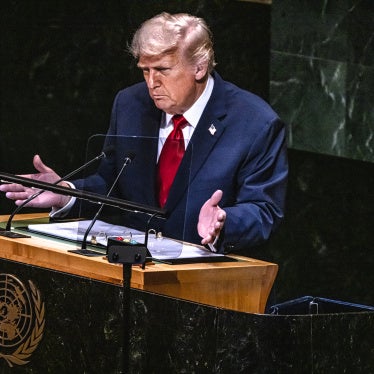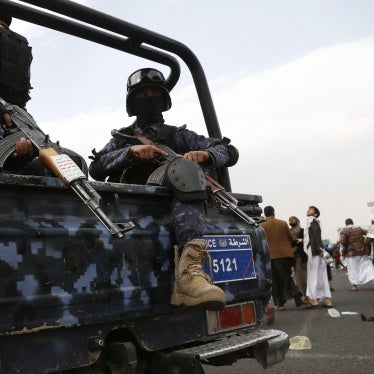Introduction
In May 2006, Human Rights Watch released its initial paper on the functions of the new Human Rights Council (HRC), focusing on universal periodic review (UPR), country situations, and the review of special procedures. In the ensuing months, numerous member states, nongovernmental organizations (NGOs), and leading scholars have offered proposals for how the UPR should be conducted. This discussion paper revisits the Human Rights Watch paper, taking account of the many proposals that have been made, in an attempt to identify the key points necessary to creating an effective system for UPR.
Existing peer review systems provide useful models for an effective UPR system, including the Organization for Economic Cooperation and Development (OECD), the International Labor Organization (ILO), and the African Peer Review Mechanism (APRM), created by The New Partnership for Africa’s Development (NEPAD). APRM has been widely cited as a model, and entails a robust review procedure with five stages.
Key elements of an effective UPR
There are many possible approaches to peer review, and a variety of acceptable answers to the many questions that will arise in the effort to develop an effective process for UPR. These discussions, however, should be guided by the following four principles which should be the basis for whatever approach is taken to UPR:
- The review should be based on a wide range of objective and reliable information regarding the human rights situation in the country under review;
- An effective review will require the appointment of an expert or panel of experts who will review the compiled materials and distill this material into a list of key issues for review and questions to be addressed by the government;
- The review process should include an appropriate role for NGOs, including the possibility to submit reports for consideration, and the ability to participate in UPR discussions; and
- The review should result in an outcome statement with concrete conclusions and recommendations and an agreed mechanism to ensure effective follow up.
Initial Questions
Frequency of Review
Review should occur at least every five years. Human Rights Watch would also support a chamber system as some states have proposed, which might allow for more frequent review, possibly every three years. If a chamber system is implemented, however, there should be at least three members from each regional group in each chamber. In addition, the Council should have the ability to set an earlier date for the next review of a particular state, including the possibility of following through on particular subjects, before the next full cycle for UPR. Human Rights Watch would not support the proposal that countries should be reviewed with differing frequencies based on their level of development, an idea which is contrary to the principle of universality that is central to this review process.
Standards for Review
There has been much discussion concerning the standards for review of each country’s human rights situation. It is widely accepted that the standards set in the Universal Declaration of Human Rights (UDHR) and customary international law, including for example Common Article 3 of the Geneva Conventions, should apply to all states under review. Human Rights Watch supports this approach which sets a minimum uniform baseline by which all states will be reviewed. This standard should provide the degree of specificity required for the UPR process, and would help avoid duplication with the work of the treaty bodies. However, the general human rights obligations of each concerned state in relation to international law must also be taken into account during the review process. In particular, where treaty bodies or special procedures have made recommendations concerning the state under review, the review should also address whether those recommendations have been implemented and what can be done to assist the state in doing so.
Members of the HRC should be subject to a heightened level of scrutiny given the requirement under General Assembly resolution 60/251 that they “uphold the highest standards of human rights.” In this context, the Council may look beyond customary international law and the UDHR to other instruments of international human rights law including the core human rights treaties to determine what constitutes the “highest standards of human rights.”
Preparatory stage of review
Human Rights Watch suggests the following modalities for assembling information regarding the state under review:
- The date of the UPR for each state is set well in advance to facilitate the participation of interested parties;
The HRC bureau appoints an independent expert, selected from a roster prepared by the Office of the High Commissioner (OHCHR), as session rapporteur for each state; - The Office of the High Commissioner compiles all relevant U.N. reports on the country concerned, including the reports of the special procedures, treaty-monitoring bodies, commissions of inquiry, the Secretary-General, OHCHR and other U.N. field offices, and, where appropriate, peacekeeping and peace building missions;
- OHCHR further compiles available reports on the country from national human rights institutions and domestic, regional, and international intergovernmental and nongovernmental organizations, including national NGOs whether or not they have ECOSOC accreditation, and credible academic and media reports;
- The session rapporteur prepares a summary of the full dossier, listing all of the significant human rights issues identified in the reports and research. The summary, together with the full dossier, is provided to the members of the HRC;
- Finally, based on all of the materials assembled, the session rapporteur prepares written questions for the state sufficiently in advance of the scheduled review session so the state can respond in full and members of the HRC can review the state’s response.
There appears to be widespread agreement that professional staff should compile the initial information to be used in the review process. Many stakeholders have also described a role for independent expert(s)—whether also from OHCHR, an independent session rapporteur appointed as we have suggested, or a panel of experts—in summarizing this information, and preparing questions for the state under review.
The Interactive Dialogue
The review will only be effective if there is sufficient time allotted for an effective interactive dialogue. Human Rights Watch therefore reiterates its recommendation that these sessions take place in addition to the minimum of ten weeks allotted for the normal business of the HRC. The proposal by many states that a half-day session of three to four hours duration be allocated to each country under review provides a good basis for the review, although the Council might decide to allocate more time for especially large countries.
Human Rights Watch suggests the following modalities for the dialogue itself, to be moderated by the session rapporteur:
- The state concerned makes a presentation of the state’s record of fulfilling its human rights obligations and the challenges it faces in doing so. This presentation addresses the questions prepared by the session rapporteur;
- Comments on the state’s presentation and questions to the state are made by Council members, observer states, and nongovernmental organizations;
- The state responds to the comments made and questions posed.
- Recommendations regarding capacity-building and technical assistance that would assist the state to meet its obligations;
- Recommendations for visits by thematic special procedures or by a relevant existing country rapporteur;
- A recommendation to establish an OHCHR mission or field office;
- Recommendations for action by U.N. agencies present in the country being reviewed;
- Appointment of a country-specific rapporteur;
- Setting a date for the next review of the state that is sooner than the state would have been reviewed in the regular UPR cycle;
- A recommendation to the Security Council to consider the situation given its impact on international peace and security or the application of Responsibility to Protect; and
- A recommendation to the General Assembly to suspend an HRC member for gross violations of human rights.
Outcome and follow-up
Each UPR session should have a concluding statement of the review, including conclusions and recommendations, with an initial draft to be prepared by the session rapporteur. The outcome document should be adopted by the HRC, and the state involved should be afforded the opportunity to submit a supplemental document that would contain any responses, clarifications, or objections to the statement.
The concluding statement may address any number of measures to assist, encourage, or require the state under review to fulfill its human rights obligations and commitments. These could include:
The UPR process should also include a mechanism for follow up on the conclusions reached and recommendations made. One possibility would be for OHCHR to monitor implementation of recommendations made through the UPR process and to provide regular reports to the HRC.








